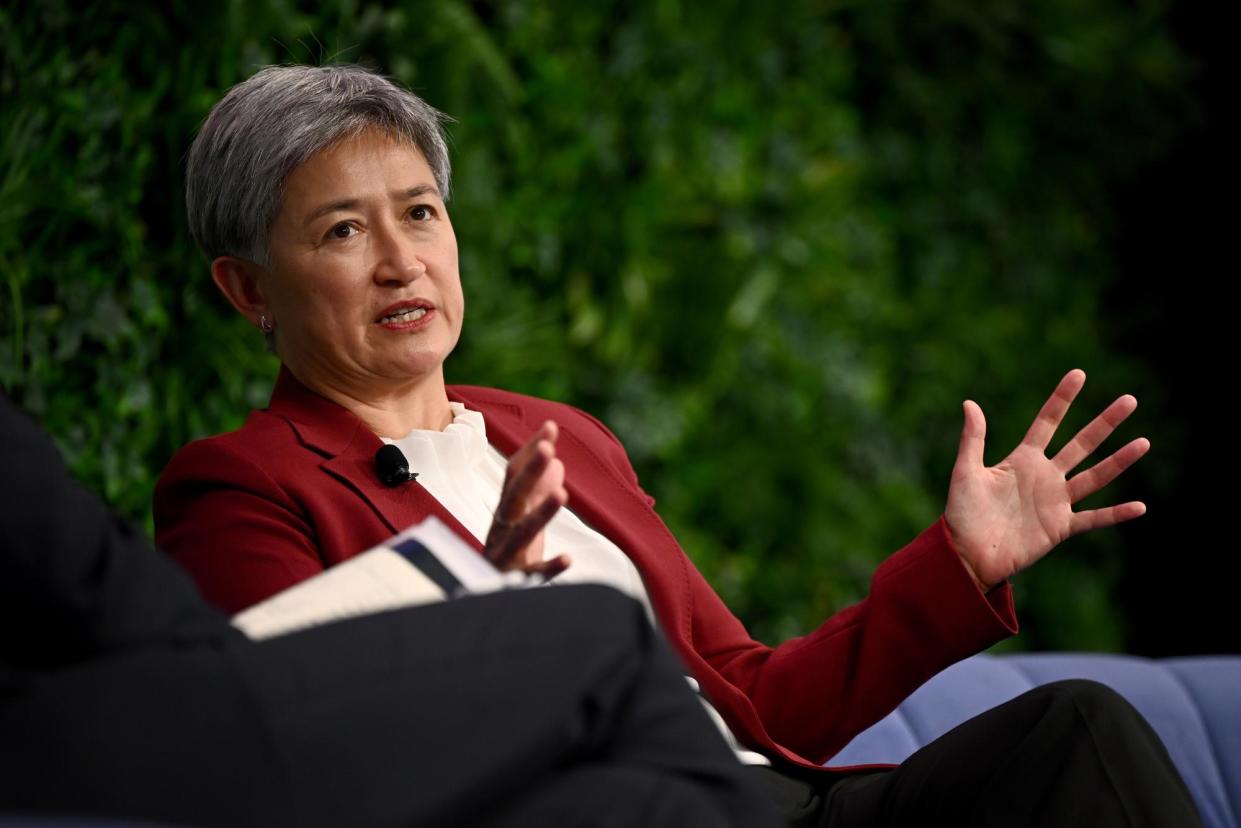Australia’s foreign minister warns Israel will continue to lose support unless it ‘changes course’

The Australian foreign minister, Penny Wong, has warned that Israel will continue to lose support from the international community unless it “changes its course”.
Wong also backed the view of the US president, Joe Biden, who said on Saturday that the Israeli prime minister, Benjamin Netanyahu, is “hurting Israel more than helping Israel” in his approach to the war against Hamas in Gaza.
“President Biden’s assessment is right,” Wong told the Australian Financial Review business summit on Tuesday.
Related: Netanyahu says Biden ‘wrong’ after US president criticises approach to Gaza war
Wong again condemned Hamas’s “horrific terrorist attack” on southern Israel on 7 October, saying “the world was rightly very sympathetic to and in solidarity with Israel at that time”.
But she noted the impact of Israel’s military response on its international standing, stating “we have now a humanitarian catastrophe in Gaza”.
“I think the world is horrified at the current situation, the loss of innocent civilian lives and the scale of the humanitarian crisis. And what I would say is I think [that] unless Israel changes its course, it will continue to lose support.”
In conversation with the AFR international editor, James Curran, Wong said Australia was trying to “amplify the things that we care about” by working with Canada and New Zealand.
This included voting together at the UN general assembly in December for an immediate humanitarian ceasefire and the release of hostages.
Wong said these countries were working together because they were members of the Five Eyes intelligence alliance and supported the state of Israel, but also viewed “international humanitarian law as being so important”.
Related: The story of Gaza’s destruction in 100 lives – a visual guide
Netanyahu has rejected Biden’s criticism and has also said Israel will not give in to international pressure to stall an attack on the southern Gaza city of Rafah, describing it as “the last Hamas stronghold”.
Netanyahu said last week: “Whoever tells us not to act in Rafah is telling us to lose the war and that will not happen.”
The prime ministers of Australia, New Zealand and Canada last month warned Israel against a carrying out a “devastating” and “catastrophic” ground offensive on Rafah, where about 1.5 million Palestinians are taking refuge.
“There is simply nowhere else for civilians to go,” the prime ministers said.
Wong said Australia was pursuing “middle power diplomacy” even though there were limits to its influence.
She pointed out that Australia and New Zealand had also jointly called on Israel to “act in accordance” with the international court of justice’s interim ruling in the case brought by South Africa.
Related: Gareth Evans tells Labor to ‘get off the fence’ and restart UNRWA funding to help ease Gaza crisis
The Guardian revealed earlier on Tuesday that 12 of Israel’s most prominent human rights organisations had signed an open letter accusing the country of failing to comply with the ICJ ruling that it should facilitate access of humanitarian aid into Gaza.
The same ruling also ordered Israel to “take all measures within its power to prevent” genocidal acts. The provisional order has previously been condemned by Netanyahu, who said the fact the court was willing to discuss the genocide allegations against Israel was a “mark of shame that will not be erased for generations”.
Wong also reiterated on Tuesday that she was concerned about rising levels of antisemitism and Islamophobia in Australia.
Without naming any individuals, Wong said there were “people who claim to represent the cause of justice and freedom and tolerance” who were “behaving here in Australia in ways which are contrary to that”.
“We have a pluralist democracy, where we have differences of views, but we have tried to express those differences with respect and with some regard for each other’s common humanity,” she said.
“And I think some of the rhetoric and some of the antisemitism and Islamophobia that I have seen is really not in keeping with who we are or who we should aspire to be.”

 Yahoo News
Yahoo News 
